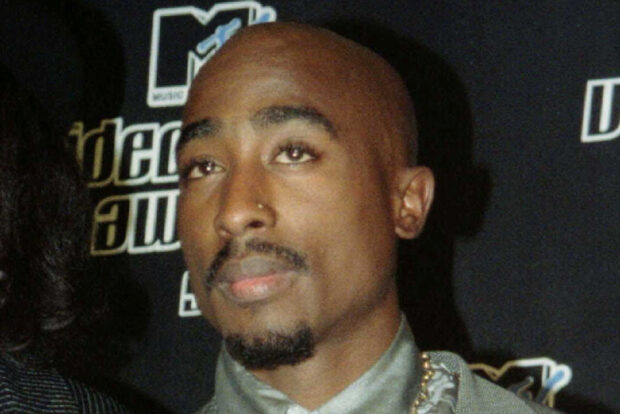Former gang leader charged with rapper Tupac Shakur’s 1996 murder

Rapper Tupac Shakur at the MTV Music Video Awards in New York City, September 4, 1996. (REUTERS)
LOS ANGELES – A former gang leader was charged Friday with the 1996 murder of rap legend Tupac Shakur, whose shooting death rocked the music world and exposed the violent underbelly of the popular gangsta rap genre.
Duane “Keffe D” Davis was arrested around a decade after he began to speak publicly about his involvement in the slaying, boasting that he was the “on-site commander” of the effort to murder Shakur and Death Row Records boss Suge Knight.
“The presumption is great that he is responsible for the murder of Tupac Shakur, and he will be found guilty of murder with use of a deadly weapon,” prosecutor Marc DiGiacomo told a court in Nevada.
Shakur, the best-selling hip-hop artist behind hits such as “California Love,” was gunned down in in Las Vegas on September 7, 1996. He was just 25.
Shakur was signed to Death Row Records, an outfit associated at the time with Los Angeles street gang Mob Piru, which had a long-standing beef with the Southside Compton Crips.
Article continues after this advertisement“By mid-September 1996, there wasn’t much of a distinction between Mob Piru and Death Row Records,” DiGiacomo told the court.
Article continues after this advertisementDiGiacomo said the genesis of the murder had been a fight in Los Angeles between gang members, during which someone tried to steal a Death Row Records chain.
On the day of the murder, Shakur and Death Row Records co-founder Marion “Suge” Knight were in Las Vegas to watch Mike Tyson fight, along with other Mob Piru gang members.
At the fight, they saw Crips member Orlando Anderson, the man they blamed for trying to steal the chain and “there was a giant beat down,” DiGiacomo said.
Anderson’s uncle is Davis, the leader of a Crips faction.
“He formulated a plan to exact revenge upon Mr Knight and Mr Shakur,” DiGiacomo said.
“In furtherance of that he acquired a 40-caliber Glock firearm from a drug associate.
“He gets into (a) Cadillac and he provides the 40-caliber Glock firearm to one of the two individuals in the back seat,” and the car set off to find their intended victims.
The two rap moguls were spotted in a vehicle on a Las Vegas street.
“They pulled up next to the vehicle and the rear passenger fired a number of rounds out of that vehicle striking Mr Knight in the head and Mr Shakur several times,” DiGiacomo said.
The prosecutor said what happened on that night had been largely understood by investigators for many years, but they had not had sufficient admissible evidence to advance their case.
That began to change when Davis published an autobiography and spoke about the crime for a TV show.
“He admitted within that book he did acquire the firearm with the intent to go hunt down Mr Shakur and Mr Knight,” DiGiacomo said.
“He admitted to being the front right passenger in the light Cadillac and that he was the on-ground, on-site commander of the effort to kill Tupac Shakur and Suge Knight.”
Davis was remanded in custody, and with a court hearing in the case scheduled for next week.
Rivalry
Shakur had a brief but stratospheric career, rapidly rising from backup dancer to self-styled gangsta rapper and one of the most influential figures in hip-hop, selling 75 million records.
He became a key figure in a vaunted rivalry, egged on by promoters, between East Coast and West Coast hip-hop.
Though born in New York, Shakur moved as a teenager with his family to California, becoming one of the most identifiable figures in the West Coast scene.
Shakur’s murder was followed six months later by the gunning down of his rival, East Coast rapper Christopher “The Notorious BIG” Wallace.
Many believe they were slain as part of a rivalry between their music labels, LA-based Death Row and New York’s Bad Boy Entertainment.
But some music historians say the coastal rift was exaggerated for commercial reasons.
Shakur — whose mother Afeni was active in the Black Panther movement and named him after Tupac Amaru, a revolutionary Inca chief — used his lyrics to highlight issues facing Black Americans, from police brutality to mass incarceration.